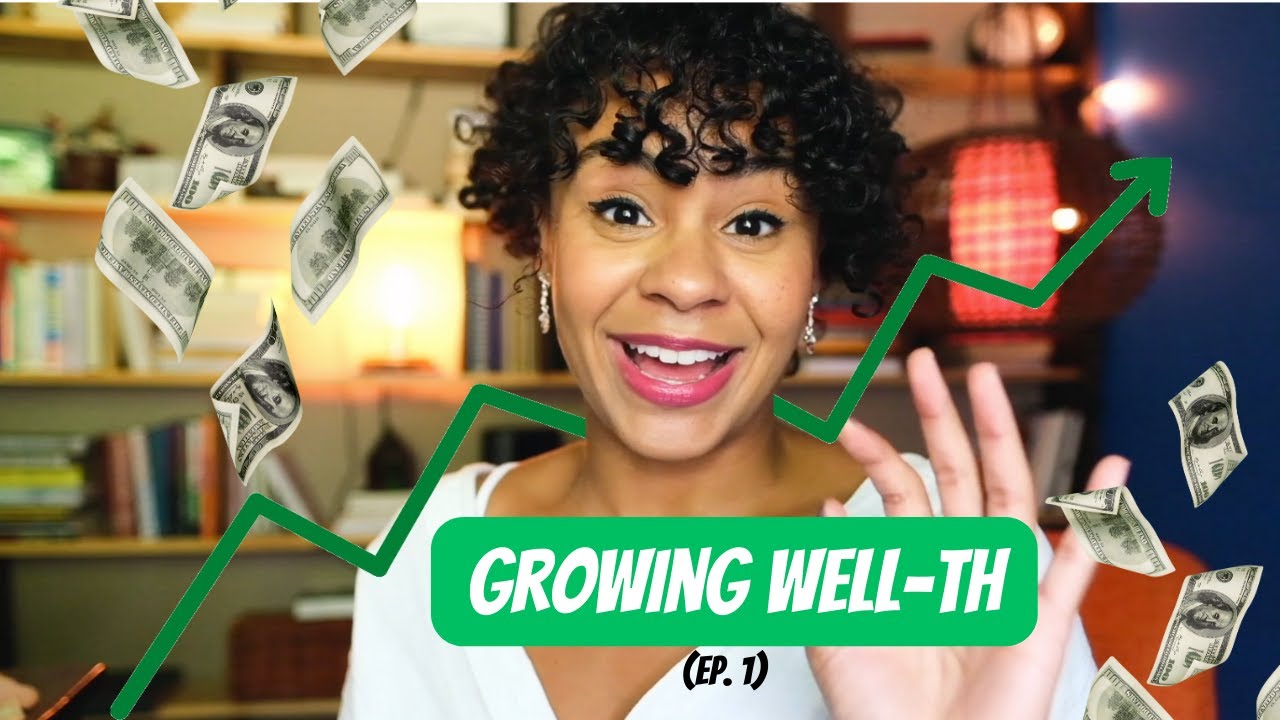
I Asked a Financial Advisor How to Build Wealth (ep 1)
Jason 0 Comments Retire Wealthy
– I love talking about money, and I've been doing it for years. Young Joanna at 17 years old, man, she was doing everything she could to be financially independent
and get rid of debt 'cause bad credit ain't cute! Funny, I was never good at math,
but I'm not bad with money! Feel that counting twice (giggles). In this video, I'm gonna break it down! This is the story of entrepreneurship. This is the American dream story. This is the art of turning
nothing into something and that something is tangible, which is this house that I'm living in. Because it's not really just about money.
I always saw money as
my ticket to freedom. As my ability to travel the world. Spend time with friends, family. Treat people I love well. Treat myself well. Spend time learning languages
or building businesses. Money to me was always the gateway to the life I have always wanted to live. But the problem? If your family has money, you
will be educated about money and therefore you will make
better financial decisions. That is not the case for somebody like me. As an immigrant, my mom was
too busy trying to survive, so thriving was never an option. So now I'm on a mission to educate myself, to give myself and everyone
watching these videos a fighting chance at
closing the wealth gap.
They don't teach you this
in school for a reason. I've partnered with Hightower Advisors to bring you a mini-series where I, Jo Franco, go into the process of actually working with
a financial advisor. And I gotta keep it real. As somebody who's bought my house in cash, bought my car in cash, and read as many books
and watched as many videos and listened to as many podcasts to start investing my own
money, I was a little skeptical. How would the advisor take me
from kitty pool money language to big boy swimming in the deep end? And that's what we're gonna figure out.
– Cue the intro, sis! ♪ You know she's not your average Jo ♪ ♪ Not your average Jo ♪ ♪ Not your average Jo ♪ Really, when we're talking about money, we're talking about freedom to choose how to spend this time
that we have on Earth and how we're gonna set up the rest of our generational wealth. Many of the people in my
life are people just like me. They are the first ones in their families to acquire good jobs and good
pensions and good savings, and we are a little lost. Here's the good news. We are living in the age of knowledge, which means that there's
more information out there about financial literacy.
– [Bob] You ask these people,
these young investors, who they listen to for
advice on investing? It's the internet. It's YouTube. – Statistically speaking,
it's never been easier to learn about money and
get yourself in the market. Back in the day, there
were all these gatekeepers, trades were really expensive, and it was something
reserved for the elite. But now with robo investment apps and all of these different softwares, you can put your money
in the market today. – Because there's a difference
between financial access and financial literacy. And so you're right, we're in a world of
amazing financial access. You can go buy some Netflix,
you can go buy some Amazon because, guess what, you don't don't even have
to buy a share of it. You can buy a fractional share of it. – That was Bob Oros. He's the CEO and Chairman
of Hightower Advisors, which is a wealth management company.
And their motto is to
build financial well-th, as in W-E-L-L-TH, for their clients because they believe
that money is not just to make someone rich, it's to help them live a richer life. – The literacy to know how to use it and how to really put
fundamental lessons in place using that access is where we're missing. We're in a world now that
there's an app for everything.
– But the truth is that
we can get caught up in a lot of hypes and we're not learning how to
nutritiously handle our money. Because the thing about money is that you're planting
seeds for your future, so yourself today is paying it
forward for your future self, so you have to think with the
wisdom of your older version, and that's a lot of reverse engineering, especially if you're doing
things with a million tabs open and DIY the way I've been doing it.
– That is a huge issue for our country, is really a lack of literacy 'cause they don't teach a lot
of this in school anymore. – And Bob would know 'cause
he manages a lot of money. – To put it in perspective,
we manage over $140 billion, so it's a lot more zeros than I probably couldn't
even conceptualize at times. But we've always tried to be the anti-Wall Street Wall Street firm. – When I told him what I do, that I make videos learning things, he wanted to give me the experience of working with an advisor
so that I would learn not only how to set myself up for success, but be able to share
this process with you. – So yes, we're in financial services and, yes, there are some
bad actors in the industry who call themselves financial advisors. And I think part of the complexity is it's easy to give yourself a title and it really comes down to
what role are you playing on behalf of the people you serve? And we are in a business where
our advisors are fiduciaries. They are legally obligated
to act in your best interest, not when it's convenient, at all times.

– And I was like, "Bob, sign me up" because from personal experience I know that if you don't have
your finances in order, you can't be taking those trips, you can't take those holidays, you can't treat your family and friends with things that they want or that you want to treat them with. It's hard to make choices when you don't have
control over your finances, and this shouldn't be something that's only reserved for the wealthy. – Not all financial advisors are bad. Most are good and really are excited for
you to tell that story.
– This statistic blew my mind. There's a statistic that
came out a couple years ago that says people are more concerned about running out of money
than they are about dying. And I was like, "whoa,
okay, we gotta fix this!" – Because I like to keep it real, I needed to get the
elephant out of the room. What is the difference between working with a financial planner versus doing it DIY? And part two of that question is do you need a certain amount of money in your account or investments to even find it valuable to you? – It's a really good question
because the great thing now is that there's so many free tools online to really get started, but it really depends on how
dedicated someone is gonna be to managing their own investments.
Part of my job is to come and
meet people where they are and say, "okay, where you are right now, the flat fee approach
makes sense to you for you" or "if going forward
you get to this level, or this is what you want to implement, then the sort of full-service approach makes a little bit more sense" because there are great websites that allow with FinTech and
with all of these resources, you can do it yourself. It's just you have to really be dedicated to holding your tax person accountable, holding your attorney accountable, making sure you're checking
in on your investments on a regular basis to
make sure they make sense.
– When do you say
somebody should be looking for a financial advisor, even if they don't come
from that money background? – And this is not self-serving,
as soon as possible. And I mean that because
there's so much power in starting out doing it right. Meaning having someone who
can help you understand how do you save effectively? How do you pay down that student debt that so many young people
are carrying with them? How do you take advantage of a 401K if you happen to be in the
workforce working for a company? And these are all lessons
that if you do things well when you're 22, 23, 24,
the power that's created, and especially the power
of compounding, it is real.
– Compounding, do not forget this word. So basically compounding is
when your assets' earnings, whether that's interest or capital gains, then get calculated back into your capital and therefore you're making
interest, or capital gains, on top of not only the principle, AKA what you first invested,
but what it yielded. So the key to compounding is time and guess who has all the time to take advantage of compounding? Young people! So the sooner you get started in managing your money and investing it, the better you are. – It's hard if you wait till you're 40 and then say, "oh, now
I'm ready for an advisor." You've just missed a
huge part of your life and a huge window.
So I believe get advice as
soon as you possibly can. – This is why it's so important to me to get educated about this because I know from what you just said, this isn't something that
will just change my life. It becomes compounding
for lifetimes of people who come after me in my family. – It's crazy when you think about the fact you will likely impact generations that you might not even know. Money is not just to
satisfy your own needs. Having money allows you to do other things that have even a greater good.
Money is a lot more than just
what you see at face value. It has this sort of exponential impact or opportunity to change the world. If handled right, that dollar's worth a
lot more than a dollar. – And then suddenly I'm agreeing to let a stranger see all
of my financial baggage. Leave a comment below. What questions do you have
about money management and what we should be doing to set set ourselves up correctly? I'm genuinely thrilled because I know that this
is just the little seed that has been planted
for 10-year-older Joanna and 20-year-older Joanna and
as-long-as-I-live Joanna, because when you set yourself
up for success financially, you are able to really carve out what you want to experience in life. You're not reactively living,
you're proactively living, and if this is all we get, I
want to do it as best as I can, and I want to help you guys do it too.
(soft funk music).
Posted in Retire Wealthy